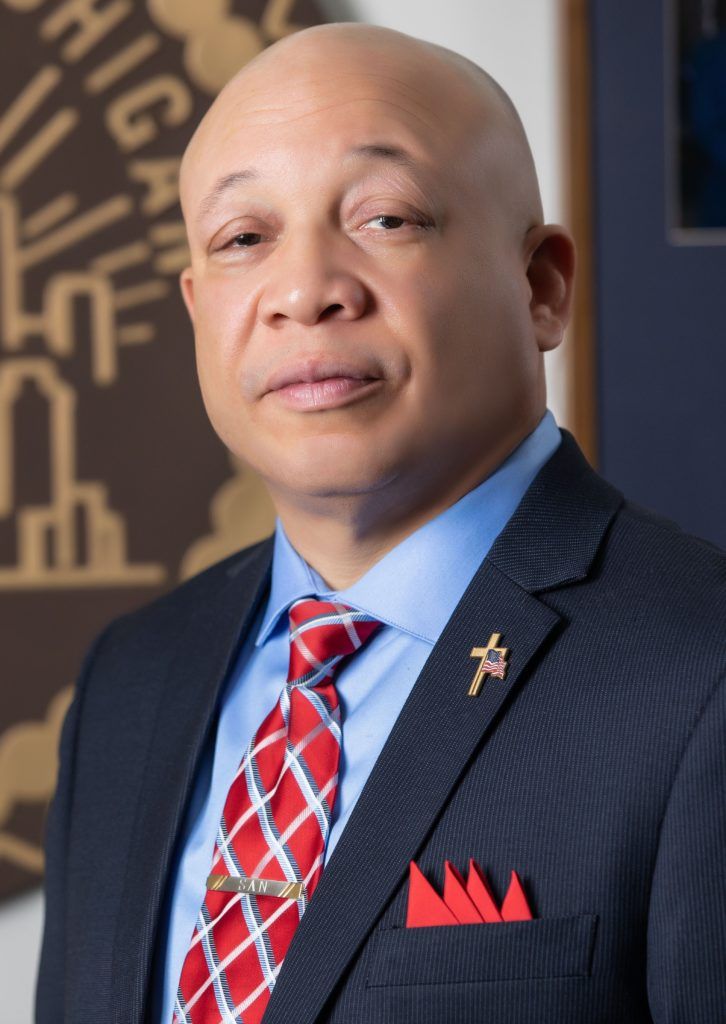About
Learn about City of Flint, Michigan including our News & Press Releases and Team.
Talk to us
Have questions? Reach out to us directly.
Learn about City of Flint, Michigan including our News & Press Releases and Team.
About City of Flint, Michigan
- Population
- 80,628
- Mayor
- Sheldon A. Neeley
- Total Outstanding Direct Debt
- $344,662,795
Flint is the largest city and county seat of Genesee County, Michigan. It is located about 66 miles northwest of Detroit. As of the most recent 2020 survey, There are over 81,000 people that call the city of Flint home. This makes Flint the state's 12th largest city.
Flint was founded as a village by fur trader Jacob Smith in 1819 and grew into a major lumbering area during the nineteenth century. From the late 1800s to the mid-twentieth century, the city was a leading manufacturer of carriages and, later, automobiles, earning it the moniker “Vehicle City.” General Motors (GM) was founded in Flint in 1908, and the city grew into an automobile manufacturing powerhouse for GM’s Buick and Chevrolet divisions.
Since then, Flint & Genesee county have been known for its connection to the automobile industry. Back to the Bricks, a week-long classic car show, is one of our most popular annual events. Around the Flint & Genesee area, you can look forward to the Alley Fest, the Flint Jazz Festival, 80s in the Hole, and Flint Drop Fest for live entertainment and highlight local and national talent. Professional and semi-professional sporting events bring together fans of ice hockey, soccer, and golf. The HAP Crim Festival of Races offers runners a one-of-a-kind opportunity to tour historic Flint neighborhoods and race down Saginaw Street’s bricks. Flint is also home to many art festivals, fairs and local craft shows.
Image Gallery
News
News
October 25, 2023
The City of Flint administration is calling a special city council meeting tomorrow, Thursday, October 26 for the purpose of allocating ARPA funds to priority community projects as outlined in the City’s ARPA plan.
The agenda will include new resolutions, as well as resolutions that the council has not acted on at previous meetings. Many of these allocations are the administration’s recommendations for community grant programs.
One proposed allocation for the North Side City of Flint Customer Service Center would be implemented internally by the City of Flint.
The administration is also proposing an additional $1 million for home repair. The City of Flint is finalizing arrangements with service providers and expects applications to open for intake next week.
Berston Field House Renovation and Expansion
The first new resolution proposes a $1 million allocation to Friends of Berston for the renovation and expansion of Berston Field House. This would be allocated from the Contingency line item of the ARPA Allocation Plan adopted by the Flint City Council on October 24, 2022.
The Mott Foundation President Ridgway White announced today at a groundbreaking ceremony for Berston Field House that the foundation will provide matching funds for all donations to the project, turning Flint’s additional allocation of $1 million into $2 million.
“It’s very important to put these dollars to work for the people of Flint,” Flint Mayor Sheldon Neeley said. “We have the opportunity double the impact of ARPA of dollars for the oldest recreational facility in the city of Flint, doubling our investment.”
In November 2022, the City kicked off a capital campaign for Berston Field House with an allocation of $1.5 million in ARPA funds to support the renovation and expansion of the City’s historic community center—a powerhouse of athletic achievement, community engagement for 100 years.
Alternative Uses of Vacant Lots
The City is also proposing $350,000 for alternative uses of vacant lots, as outlined in the City’s ARPA allocation plan. These funds would be granted to six community organizations to implement projects using vacant lots.
A grant of $100,000 to Active Boys in Christ would fund the development a vacant lot at 2701 Branch Rd. into the outdoor space of a youth training center for ages 7-17. The funds would be used to develop a portion of the property into a community garden, outdoor play area, and a full outdoor basketball court.
A grant of $125,000 to Friends of Berston would specifically fund site improvements and the demolition of abandoned buildings on vacant lots to build the new baseball diamond and soccer field as part of its larger project. Berston will expand its site from 6.85 acres to 14.60 acres by purchasing an abandoned church property to the northeast and vacant residential property to the south.
With this additional property, Berston will move the current softball field and outdoor basketball courts, add much needed on-site parking, add a Little League baseball field, a football/soccer/lacrosse field, pickleball courts, playgrounds, a splashpad, and add an outdoor amphitheater venue for summer concerts.
A $25,000 grant to Communities First would add an additional vacant lot to the third and final phase of its Foodie Commons @ the Flowershop. Envisioned as Flint’s first dedicated food truck park, Foodie Commons will offer supports for small businesses, flexible community gathering spaces for events like neighborhood meetings and amenities for all seasons.
Carriage Town Neighborhood Association would use a $25,000 grant to develop a playground at an informal pocket park. While numerous parks are near the neighborhood, none offer play equipment for children and families. During the covid-19 pandemic, residents created this pop-up space to support social gatherings with live music, games, and local vendors.
A $25,000 grant to Hispanic Technology Center would fund a pavilion and picnic table project at a neighborhood pocket park on two vacant lots that were adjacent to the center. This project was identified as a priority through a community engagement process—part of a long-term vision of transforming Lewis Street into Flint’s Latinx District.
Finally, Mott Community College would use a $50,000 grant for the Clark Commons Garden and Park Project. This will include a community garden with fruit trees and a small park with recreational space, seating, art, and an outdoor exercise area.
Gap Financing for Residential and Mixed-Use Projects
The administration also recommends funding Gap Financing contracts in the amount of $1,400,000 from the category of Neighborhood Improvement as proposed in the City’s ARPA Allocation Plan on October 24, 2022.
This includes eight separate allocations for community projects:
$100,000 for MADE Institute to renovate five transitional houses for returning citizens.
$125,000 for Communities First to develop affordable housing at 716 S. Grand Traverse.
$150,000 for Habitat for Humanity’s Sylvan Court Almost Home Project.
$200,000 for YMCA to develop 50 residential units.
$125,000 for McFarlan Village to expand quality and affordable housing at 800 E. Court St.
$125,000 for McFarlan Village to revitalize 700 E. Court St.
$400,000 for Catholic Charities for the Sacred Heart Village tiny home community at 719 E. Moore St.
$175,000 for Hispanic Technology Center’s Early Childhood Center.
Full list of resolutions to be considered:
- Amended Resolution/ ARP A Fund Utilization/Pandemic Impact on Health Disparities of Pregnant-New Mothers and Their Infants in Flint/Michigan State/University/Flint RX Kids Program (Resolution #230281.1)
- ARPA Fund Award/LatinXTechnogy Center/Impacts of the Pandemic on Blight (Resolution #230304)
- ARPA Funding Award/Neighborhood Engagement Hub/Impacts on the Pandemic on Blight (Resolution #230310)
- ARPA Funds Award/James E. Kennedy Family Life Center/Impacs of the Pandemic on Blight/Ward 1 (Resolution #230319)
- ARPA Funds Award/Sylvester Broome Empowerment Village [SBEV]/Impacts of the Pandemic on Blight/Ward 3 (Resolution #230320)
- Approval/Lease for 4813 Clio Road/Pilot Project/North Side City of Flint/Customer Service Center (Resolution #230334)
- Resolution for 2nd ARPA Grant in Support ofBerston Field House Capital Improvements (Resolution #TBD)
- Resolution to Proceed with ARPA Funds Grants for Alternative Uses of Vacant Lots (Resolution #TBD)
- Resolution to Proceed with ARP A GAP Financing for Residential and Mixed-Use Projects (Resolution #TBD)
- Resolution to Revise Prior Adopted ARPA Home Repair Resolutions to Increase Spending Authority and Increase Number of Households Served (Resolution #TBD)
News
September 7, 2023
Flint Mayor Sheldon Neeley announced on Sept. 6, 2023 that Phillip Moore will join the City of Flint team as the new Chief Financial Officer.
Moore brings a wealth of experience in municipal finance, administration, and pension system management.
“I am excited to welcome Phil Moore to Flint as we close out the successful transition period following Robert Widigan’s departure,” Mayor Neeley said. “Mr. Moore’s deep experience in local government finance and pension system management will keep the City of Flint on a path of fiscal stability and sound decision-making.”
Moore comes to the City of Flint from the Pontiac General Employees Retirement System, where he served as Finance Officer, managing over $500 million in assets. Prior to that, he served the City of Alma for 26 years as Finance Director and Assistant City Manager, and then as City Manager.
At the City of Alma, Moore supervised all financial reporting, accounting, purchasing, payroll, investments, budgeting, debt management and tax collection activities of the City. He created cross-governmental partnerships to address infrastructure challenges and support economic development.
“I grew up in Owosso and I spent a lot of my youth coming to Flint,” Moore said. “Flint was always a very exciting place to visit, and I have many fond memories of Flint. Now, I hope to contribute to Flint’s rebirth. I’ve spent much of my career working to make Alma a better place to live, and I bring the same goal and passion for Flint.”
Moore will serve as interim CFO and his appointment will go before the Flint City Council for its consent as outlined in the Flint City Charter.
News
June 9, 2023
The Flint City Council passed Mayor Sheldon Neeley’s fourth consecutive balanced budget last night with no amendments and without any “no” votes.
“This balanced budget represents an increase in pay for all city workers as established through collective bargaining agreements, as well as increases in staffing levels and enhanced city services for residents,” Mayor Sheldon Neeley said. “We are very proud to see this administration’s fourth consecutive balanced budget brought to life for the benefit of the Flint community.”
Mayor Neeley initially introduced the budget to the Flint City Council on March 8, 2023. The budget invests in retiree pensions as required by state law and enhances public safety and city services, with no increase in property tax rates, fees, or utility costs for residents. The budget also includes an additional $1 million for blight elimination.
Information about the State of Michigan’s “Protecting Michigan Pensions” grant program was included in Mayor Neeley’s budget message to residents and the Flint City Council. The State of Michigan has allocated $170 million to stabilize the City of Flint’s pension fund through this program in the coming fiscal year, and the City continues to pursue an additional $50 million in funding.
“We are excited that our partners in the state legislature and Governor Whitmer have committed to supporting Flint residents and retirees by passing the Protecting Michigan Pensions program,” Flint City Administrator Clyde Edwards said. “By passing this legislation, they are sending a message that they have confidence in Flint’s continued growth and development as a strong economic driver in our region. As we’ve engaged in the process of securing these funds, we have been continually reassured by our State of Michigan partners that we are on track to receive these dollars to stabilize Flint’s pension fund. We are planning cautiously to ensure that the pension funding will have the greatest possible impact.”
In addition to Mayor Neeley’s budget presentation on March 8, the Flint City Council held four budget hearings on April 12, April 26, May 10, and May 15, where council members had the opportunity to dialogue with City of Flint department heads and other staff.
“I want to underscore the level of transparency provided in this budget process,” Mayor Sheldon Neeley said. “In addition to my annual presentation of the budget and the documentation made available to the public, City of Flint staff participated in four budget hearings with city council members and did an outstanding job sharing information and demonstrating the impact of their work on quality of life in the city of Flint. The administration came to the table in the spirit of collaboration, and we are pleased with the outcome.”
Team

Phillip Moore
Chief Financial Officer
Paul Borle
Deputy Chief Financial Officer
Buick City Project
Michigan officials approved Wednesday an $8.5 million loan to a developer aiming to invest $300 million and bring up to 3,000 jobs to the former Buick City site in Flint. The Michigan Economic Development Corp. gave the OK to Ashley Capital for the loan, which will be forgiven if the company meets certain performance requirements, according to n MEDC briefing memo. The loan is intended to offset "prohibitive" pre-development costs estimated at $17 million to remove 267,000 linear feet of underground utilities, and 9 million square feet of building foundations and concrete slabs at one of the state's largest brownfield sites. Crain's reported Ashley Capital's plans for the site in April. Sprawled across 412 acres, the site once served as a symbol of automobile might for the Vehicle City before General Motors Co. abandoned it in bankruptcy in 2009. The RACER Trust (Revitalizing Auto Communities Environmental Response Trust) was created by U.S. Bankruptcy Court two years later for the purpose of cleaning up the site for redevelopment. RACER owns about 364 acres of the site, which Ashley Capital is under contract to buy. Seating supplier Lear Corp. built a 150,000-square-foot plant on one of the parcels in 2017, and American Spiralweld Pipe Co. built a 183,000-square-foot plant on another in 2014. "(Ashley Capital) is looking to add the Buick City Site to its portfolio and without MSF support, the company will not move forward with the project," the MEDC memo said. If the project does move forward as envisioned, it would be the largest investment in Flint in decades. Upon securing the loan from the state, Ashley Capital committed to constructing a building of at least 275,000 square feet within three years of securing a permit, with hopes that will springboard development of the entire site. The development is also being supported by a $3.25 million American Rescue Plan Act allocation by the city of Flint, a $3.25 million ARPA allocation from Genesee County and a $2 million grant from the C.S. Mott Foundation. "The resulting increase in property tax, income tax, jobs, income for local families, spending in the local economy, and not to mention perception change for the City of Flint will have a positive economic affect that cannot be overstated," the MEDC said.
Talk to us
Have questions? Reach out to us directly.


